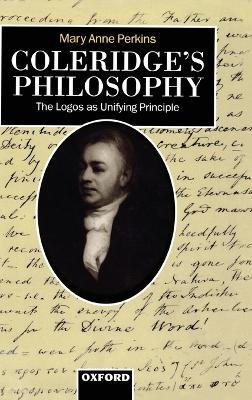
Coleridge's Philosophy
The Logos as Unifying Principle
Seiten
1994
Oxford University Press (Verlag)
978-0-19-824075-4 (ISBN)
Oxford University Press (Verlag)
978-0-19-824075-4 (ISBN)
Shows that Coleridge was much more than an opium-addicted, nature-loving Romantic poet. He contributed insights in the fields of religion, science, linguistic analysis, psychology, and political and social criticism. The author explores his attempt "to reduce all knowledges into harmony".
Coleridge's status as a philosopher has often been questioned. `I am a poor poet in England,' he admitted, `but in America, I am a great philosopher.' J. S. Mill's assertion that `the time is yet far distant when, in the estimation of Coleridge, and of his influence upon the intellect of our time, anything like unanimity can be looked for' seems to have been justified.
Mary Anne Perkins re-examines Coleridge's claim to have developed a `logosophic' system which attempted `to reduce all knowledges into harmony'. She pays particular attention to his later writings, some of which are still unpublished. She suggests that the accusations of plagiarism and of muddled, abstruse metaphysics which have been levelled at him may be challenged by a thorough reading of his work in which his unifying principle is revealed. She explores the various meanings for the term `Logos', a recurrent theme in every area of Coleridge's thought - philosophy, religion, natural science, history, political and social criticism, literary theory, and psychology.
Coleridge was responding to the concerns of his own time, a revolutionary age in which increasing intellectual and moral fragmentation and confusion seemed to him to threaten both individuals and society. Drawing on the whole of Western intellectual history, he offered a ground for philosophy which was relational rather than mechanistic. He is one of those few thinkers whose work appears to become more interesting, his perceptions more acute, as the historical gulf widens. This book is a contribution to the reassessment that he deserves.
Coleridge's status as a philosopher has often been questioned. `I am a poor poet in England,' he admitted, `but in America, I am a great philosopher.' J. S. Mill's assertion that `the time is yet far distant when, in the estimation of Coleridge, and of his influence upon the intellect of our time, anything like unanimity can be looked for' seems to have been justified.
Mary Anne Perkins re-examines Coleridge's claim to have developed a `logosophic' system which attempted `to reduce all knowledges into harmony'. She pays particular attention to his later writings, some of which are still unpublished. She suggests that the accusations of plagiarism and of muddled, abstruse metaphysics which have been levelled at him may be challenged by a thorough reading of his work in which his unifying principle is revealed. She explores the various meanings for the term `Logos', a recurrent theme in every area of Coleridge's thought - philosophy, religion, natural science, history, political and social criticism, literary theory, and psychology.
Coleridge was responding to the concerns of his own time, a revolutionary age in which increasing intellectual and moral fragmentation and confusion seemed to him to threaten both individuals and society. Drawing on the whole of Western intellectual history, he offered a ground for philosophy which was relational rather than mechanistic. He is one of those few thinkers whose work appears to become more interesting, his perceptions more acute, as the historical gulf widens. This book is a contribution to the reassessment that he deserves.
Part 1 Logos the word: logos - "communicative intelligence"; the archetypal symbol; "Jehovah-word", name of God. Part 2 Logos - light and life of nature: the redemptive scheme of nature; polarity; light, life and love. Part 3 Logos - divine reason: reason and understanding; logos - unifying principle; idea and law; "will in a form of reason". Part 4 Logos - the human principle: the "idea of humanity"; personeity in person; "theanthropology"; becoming human; conclusion - "logosophia". Appendices: Coleridge, Humboldt and the word; the "cosmic Christ"; logocentricity in Hegel and Coleridge.
| Erscheint lt. Verlag | 21.7.1994 |
|---|---|
| Verlagsort | Oxford |
| Sprache | englisch |
| Maße | 143 x 225 mm |
| Gewicht | 500 g |
| Themenwelt | Geisteswissenschaften ► Philosophie ► Erkenntnistheorie / Wissenschaftstheorie |
| Geisteswissenschaften ► Philosophie ► Geschichte der Philosophie | |
| Geisteswissenschaften ► Philosophie ► Philosophie der Neuzeit | |
| Geisteswissenschaften ► Sprach- / Literaturwissenschaft ► Anglistik / Amerikanistik | |
| Geisteswissenschaften ► Sprach- / Literaturwissenschaft ► Literaturgeschichte | |
| Sozialwissenschaften | |
| ISBN-10 | 0-19-824075-9 / 0198240759 |
| ISBN-13 | 978-0-19-824075-4 / 9780198240754 |
| Zustand | Neuware |
| Haben Sie eine Frage zum Produkt? |
Mehr entdecken
aus dem Bereich
aus dem Bereich
die Grundlegung der modernen Philosophie
Buch | Softcover (2023)
C.H.Beck (Verlag)
18,00 €
Vorlesung Wintersemester 1951/52. [Was bedeutet das alles?]
Buch | Softcover (2023)
Reclam, Philipp (Verlag)
7,00 €


